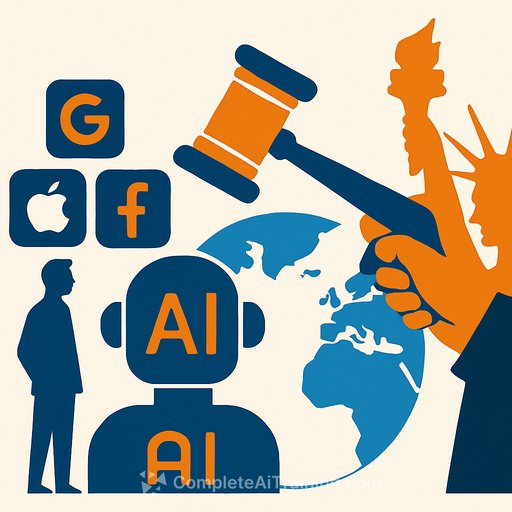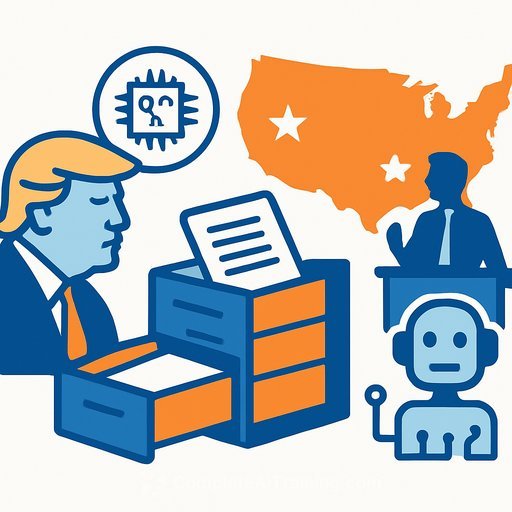Why Current U.S. Government Antitrust Actions Against Tech Giants Threaten American AI Leadership
America holds a slim lead in artificial intelligence (AI), but China is catching up fast. This competition is critical not just for economic development but also for national security and setting global standards aligned with democratic values. Yet, ongoing antitrust cases against major U.S. tech companies risk weakening the very firms fueling AI innovation.
The White House has recognized the importance of AI by calling for a review of Federal Trade Commission (FTC) investigations that could "unduly burden AI innovation." Vice President J.D. Vance emphasized the goal of keeping American AI as the global gold standard and a preferred partner internationally. Despite these statements, the government continues to pursue antitrust suits that may undercut this objective.
Big Tech's Investment in AI and the Threat of Antitrust Enforcement
Big Tech companies plan to invest $320 billion this year to maintain U.S. leadership in AI. Much of this funding comes from existing business models like online advertising on social media and search platforms. Ironically, these revenue streams are precisely what the FTC and Department of Justice (DOJ) are targeting in their antitrust lawsuits.
If successful, these actions could restrict the cash flow that funds AI research and development. This is a critical concern since AI is a long-term investment requiring substantial capital backed by profitable businesses today.
The Meta Case: Questionable Grounds and High Stakes
The FTC's suit against Meta centers on its acquisitions of Instagram (2012) and WhatsApp (2014), alleging these moves were designed to stifle competition and maintain monopoly power. However, U.S. antitrust law focuses on consumer welfare—price and product quality—not the interests of competitors.
Both Instagram and WhatsApp remain free for users and have improved since their acquisitions. Meta faces competition from platforms like YouTube, TikTok, and Snapchat, indicating a competitive environment rather than a monopoly.
Instagram alone generated $32.4 billion in 2021, accounting for 27% of Meta’s total revenue. This revenue fuels Meta’s AI investments, including a planned $65 billion spend this year and massive talent acquisitions with signing bonuses reportedly up to $100 million. Forcing Meta to divest such assets risks crippling its AI efforts and ceding the edge to foreign competitors.
Google Faces Similar Challenges
Google’s parent company, Alphabet, plans to invest over $100 billion in AI. Yet, it faces antitrust lawsuits targeting its search and advertising dominance. Last year, a federal judge ruled Google illegally maintained a monopoly on online search through default contracts with device makers like Apple.
Despite evidence showing consumer benefits from these agreements, remedies sought include divesting Chrome—Google’s browser which, while not directly profitable, drives traffic that generates ad revenue. Removing Chrome could undermine Google’s AI funding.
Another DOJ suit accuses Google of monopolistic practices in digital advertising technology. Both cases risk hampering the company’s ability to sustain large-scale AI investments.
Why This Matters for Government Decision-Makers
- AI leadership is vital for national security, economic strength, and democratic influence.
- Antitrust actions targeting revenue-generating units may reduce funding for AI innovation.
- Maintaining a competitive market should not come at the cost of weakening America’s AI capabilities.
Government officials must weigh the long-term implications of these lawsuits carefully. Curtailing the revenue streams that enable AI investment could hand critical technological advantages to Chinese competitors, whose government aligns AI development with authoritarian control.
For those interested in AI policy and technology readiness, exploring comprehensive AI education can provide valuable insights into the stakes involved. Resources like Complete AI Training's latest courses offer practical knowledge relevant to government and industry professionals.
Ultimately, balancing fair competition with fostering innovation is key. The current antitrust approach appears misaligned with the urgent need to sustain U.S. AI leadership in a fast-moving global race.
Your membership also unlocks:






